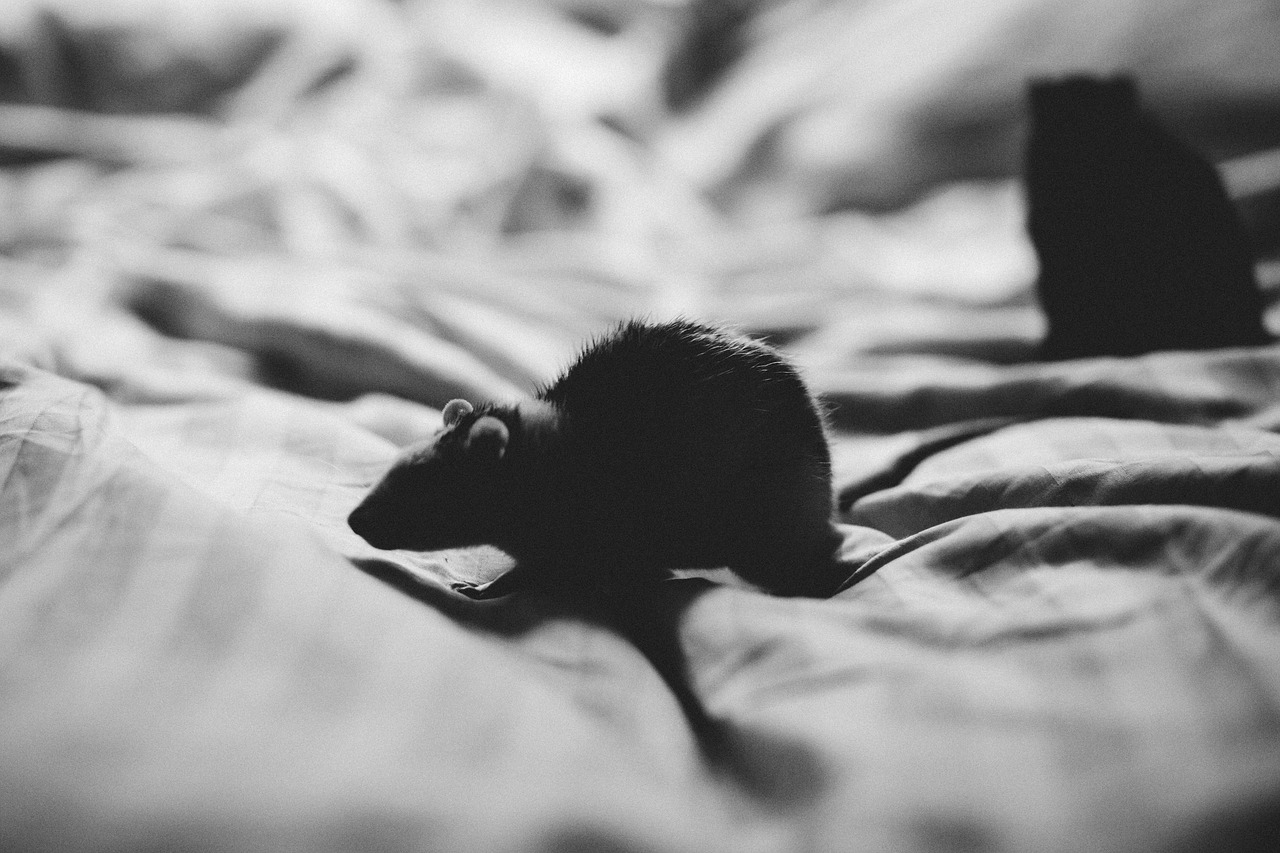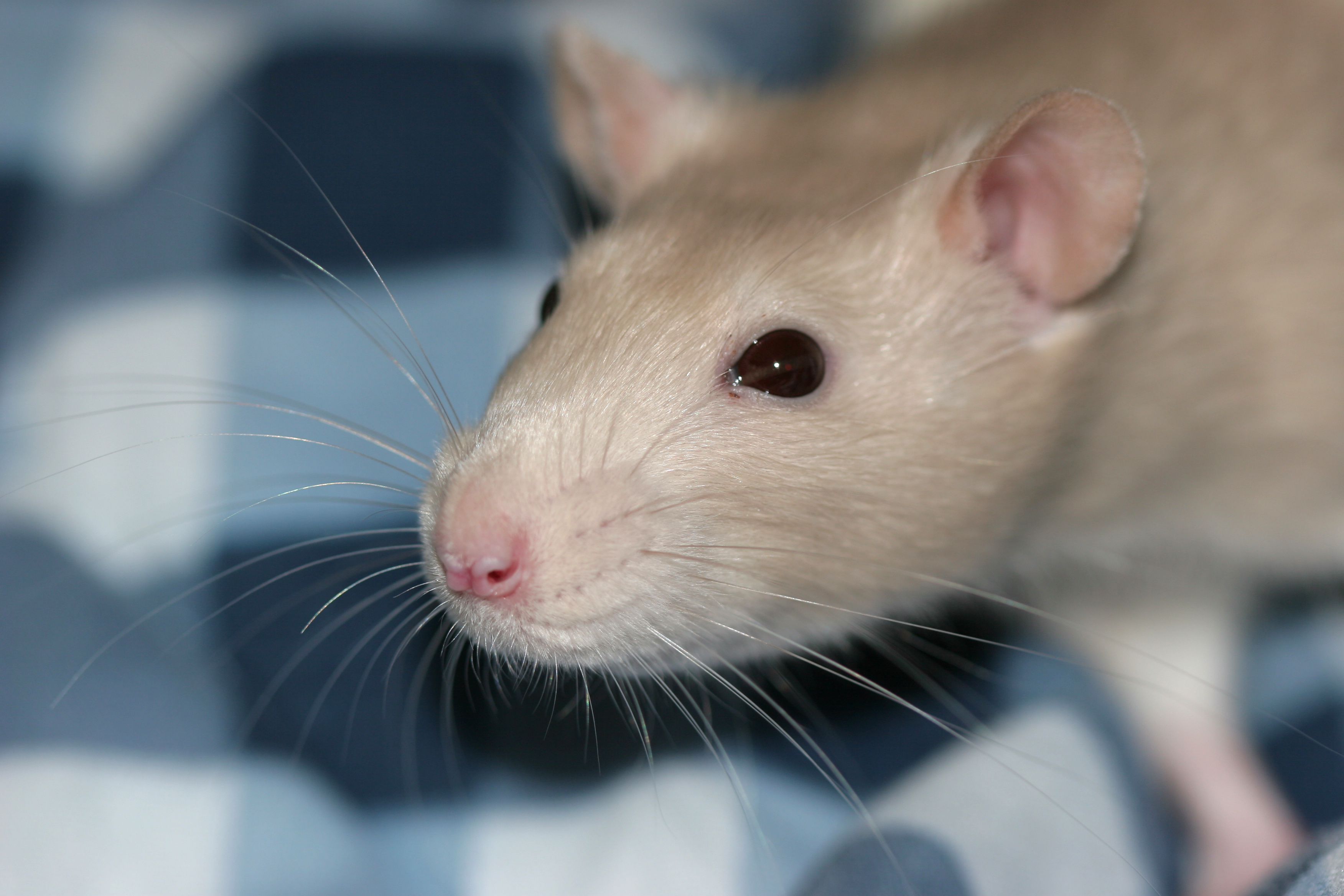Can Rats Climb On Beds?

We all love our pet rats; however, there is something that lurks in the minds of thousands of people across the world…
When wild rats invade the home, they can be of great concern. They may destroy food stores, make a home unsanitary, and spread disease to both pets and people.
Thinking of a wild, potentially diseased, animal crawling into bed with you during the night hours isn’t exactly a tranquil thought.
Can rats climb on beds? Is it possible for a wild rat to get into bed with you during the night? The news I’m about to deliver probably isn’t what you want to hear….

Understanding Wild Rats: Can Rats Climb On Beds?
Rats are excellent climbers, without a doubt. Even the little cousin of the rat, the mouse, can get to counter tops and on top of dressers. Therefore, it is safe to assume that a rat can easily climb onto a bed.
In addition, I can personally say that I know a rat can get into a bed. I once had a female rat who was a master escape artist; she was nearly impossible to contain, and would eventually break out of any cage you might put her in.
Her favorite activity was breaking out during the middle of the night, climbing onto my bed, and licking my face until I woke up; she loved looking for any tasty morsels that might be lingering from the evening before (perhaps a folded bag of Cheetos or a container of tasty trail mix), and would awaken me when she either didn’t find anything, or was ready to play.
If a very hefty, overweight, senior pet rat could leap into my bed, you’re almost guaranteed that a young, lean, muscular rat could do this without issue. As much as you don’t want to think about a wild rat curling up in your bed, it is beyond possible.

Why Would a Wild Rat Climb Into a Person’s Bed?
If you have found evidence that a rat has climbed around in your bed (or if you have been awakened and horrified by a wild rat during the night), you might be wondering why they would make an appearance where you lay your head at night; I have a few answers for you, and hopefully some solutions.

You Have Clutter By Your Bed: Rat Nest Heaven
If your bedroom is heavily cluttered (especially if the entire home is), it is a haven for wild rats to nest and rest. The more clutter you have and the longer it goes undisturbed, the higher the chances are that rats will make their homes within the clutter. Boxes, baskets or bags of clothing, stacks of paper, piles of shoes, and unused toys are excellent places for rats to hide out. Once a rat moves in, he or she will slowly become used to your room and your presence, eventually adventuring through the room in its entirety. Since rats are most active under the cover of night, you are most likely to encounter them closer to bed time. The rat may simply be exploring, and stumble upon you while you sleep.
In this case, you want to clean and de-clutter the home, preventing any clutter around your bed. If you’re short on space and clutter is inevitable, make it a point to clean and reorganize the items at least twice per month, scaring off existing rats and removing any nests that you may discover.

You Keep Food In Your Room or Eat On Your Bed
Rats can eat a lot of food; they also become very adventurous and courageous when they are hungry. If you frequently eat in bed, the rat may come looking for tasty tidbits and morsels when you are not home (or are sleeping). You may discover droppings on your bed, which leads you to find out that you have unwanted visitors. Keeping food by your bed is a bad idea if you have the slightest hunch that a wild rat may be living in the home; he or she will begin frequenting the areas where food is commonly found.
In order to resolve this, keep all food in the kitchen. Food should be kept up high, making it inaccessible to rats and mice. If food is impossible to find, the rats and mice will not have much of a reason to stay- other than nesting. Clean regularly, removing any traces of food or nesting material.

You Have Pet Rats Who Frequently Play On Your Bed
Rats, much like dogs, are always interested in learning about other nearby members of their species. They communicate many messages through pheromones and urine, marking their territory as they go. Rats are highly territorial, and are quick to fight intruders. If you have male rats and a wild male rat invading, you will have a turf war between them; the wild rat will be interested in claiming territory and investigating any messages.
If your rats are female, a wild male may be looking to reproduce; just as a wild female would visit in search of male pet rats. Rats reproduce very often and very quickly when left to their own devices, and they waste no time when in search of a partner.
If you believe that a wild rat is trying to investigate and communicate with your pet rats, launder your sheets frequently and make sure that your bed is out in the open. Do not place the bed in a corner of the room, do not surround it with night stands, do not use bed skirts, never store items under it, and do not place it near the closet.

The Dangers of Encountering a Wild Rat In Your Bed
If any wild animal finds its way into your bed, you’re going to face a few different problems.
Initially, you will need to worry about bodily harm. Rats will either retaliate or flee when they think they’re being attacked. Waving your arms, screaming, and leaping out of bed may be seen as an attack. If the animal is trapped or otherwise unable to escape, it may begin biting frantically in an effort to escape. Whether the rat’s tail is trapped under you or it’s toe nail is caught within your blankets, you risk being bitten.
Secondly, you must worry about disease. Bites, scratches, and exposure to the waste of a wild animal (both urine and feces) can all spread disease. Unfortunately, a wild rat could potentially (even if highly unlikely or rare) infect you or your pets with:
- Hantavirus
- Seoul Virus
- Rat Bite Fever
- Leptospirosis
- Plague
Finally, you’ll have to worry about damage and destruction of your personal belongings. Rats will chew on furniture, walls, papers, boxes, clothing, and more. In addition, their urine and feces may destroy belongings, especially if there is a heavy infestation. Some items may not be able to be cleaned, such as footwear or upholstered furniture. Rat excrement is very strong when concentrated, such as when an item is heavily soiled.
I once had a fantastic rat who would wander into my room and take a nap sometimes on my bed during the afternoon. It was adorable and he never did anything naughty. for people to actually worry about a wild rat coming into their home where they would encounter humans is probably not warranted. wild rats are scared of people but I guess it could happen if if if if, and that’s a lotta ifs. just remember if a wild animal does get in it can be caught and released somewhere wooded perhaps. so many animals are losing their habitat thanks to people!
It does happen, just not often. In addition, a lot of us don’t live in extremely urban settings. In highly populated cities, humans live in very close quarters with a lot of animals, including rats, pigeons, and other wildlife. When a wild animal grows up so close to people, they tend to lose their fear. In some corners of the world, these wild animals are fairly tame. Have you heard of the Karni Mata Temple? Rats, by the thousands, are held in high regard there!